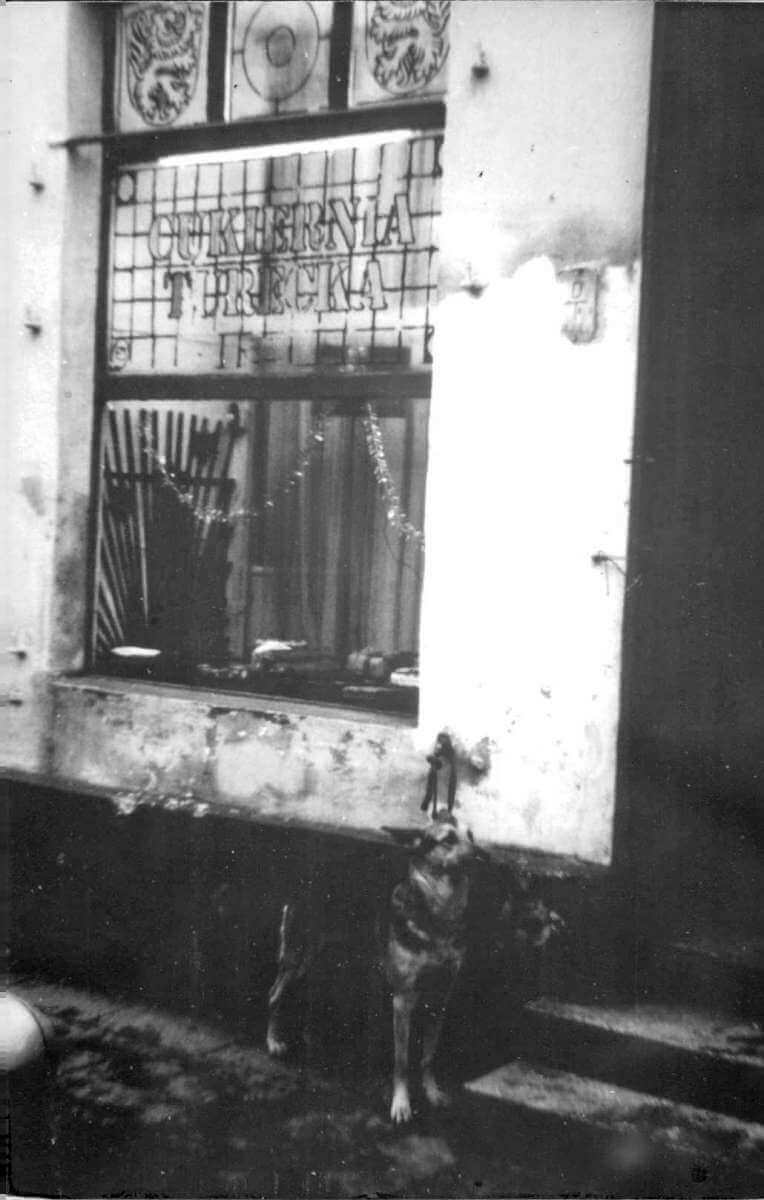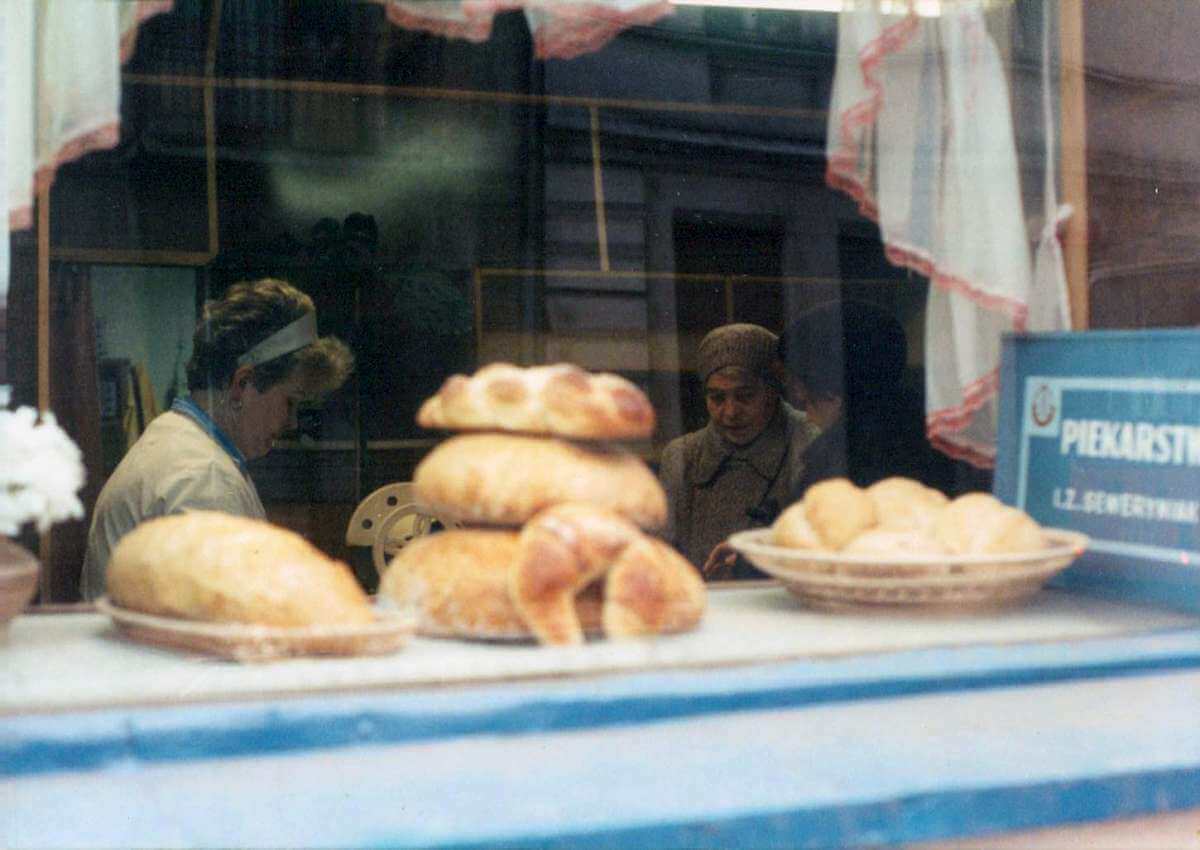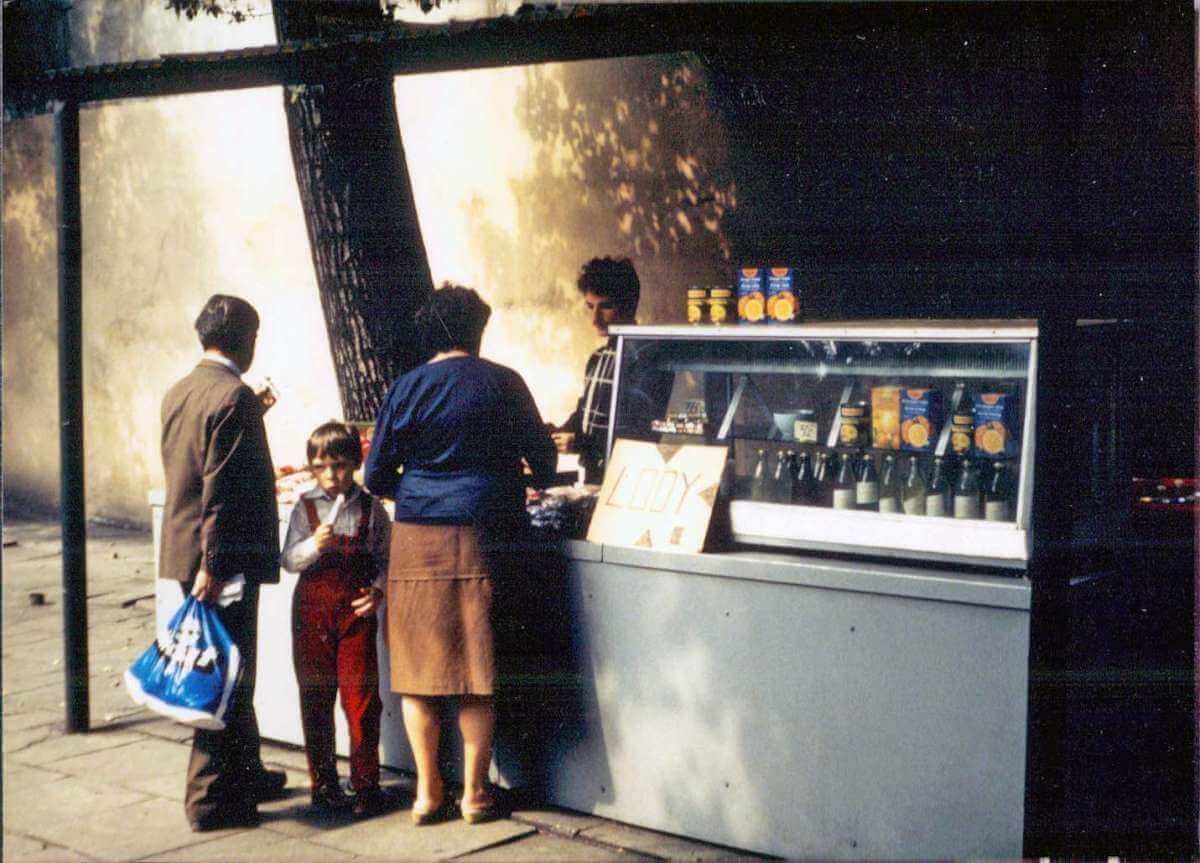It is best to go just at opening time, shortly after the bread has been delivered, when the store is heavy with the rich, yeasty smell of raised dough. Show up at seven, take your loaf of angielka directly home, cut a thick slab, and watch the butter melt from residual heat. On a winter morning, the warmth of the bread, wrapped in a plastic shopping bag and carried close to your body, is as delicious as the taste of the bread itself. On a spring morning, the scent hangs with you all the way home.
When the store is heavy with the rich, yeasty smell of raised dough.
The bread shop is the plainest facade on Nowotki: a blue doorway and window in the white cement wall, blocked most of the day by a queue of taxis. Yellow letters on the glass say simply Piekarnia. In the window a white lace curtain, a white lace tablecloth, a basket full of rolls. Sometimes there is also a plaster of Paris baker, Smurfish, hand-painted in primary colors, a larger version of the plaster figurines you painted back in 1958 at Camp Hiawatha, a present for mom (dad got a billfold, sewn through pre-punched holes with plastic gimp) to show that your two weeks at camp were more than just a holiday for you and them. Or maybe this baker is a smaller cousin of those cement lawn statues with which Italians decorate their gardens.
The shop interior is also simplicity itself. Two large rooms, one for sales, one for storage, with a sales counter in front of the wall to the left of the entrance. Two walls of the front room and all walls of the storage room are floor-to-ceiling bread racks built of heavily painted two-by-fours, or—for rolls and smaller loaves of bread—standard heavy duty pine shelving. The racks that hold the round three-pound loaves of chleb are a cross between bookshelves and wine racks. The loaves are large, maybe fourteen inches in diameter, five or six inches thick, dusty with flour, which is used liberally in the baking process. A dozen loaves set on their sides fill a shelf. There is something primeval about this early morning floor-to-ceiling bread, a vault of bread, a library of bread, bread behind, bread out front, bread and flour everywhere, and a long, curling, seemingly endless queue out the front door, the great army of Polish workers waiting patiently for their daily sustenance. “Jobs and bread,” the workers had demanded; “give us jobs and bread.”
The shop interior is simplicity itself.
The shop’s interior is not entirely undecorated. On beige paneled walls not covered with bread racks, and on top of some of the bread shelves, rest half a dozen hand-painted plates of the type sold by Lutheran Church Women at annual fund-raiser bazaars. The design is Polish flowers, and the colors are the usual yellow, brown, and green. The porcelain-faced clock is also decorated with a floral motif. There are dried flowers in vases, and a flower calendar. A pot of ivy hangs on one wall. Despite—or perhaps because of the flour—this place has the appearance of a clean, well run establishment.
Like early McDonald’s restaurants, its menu is limited:
chleb pszenny, 1,5 kg., 4000 zł.
chleb pszenny, 0,7 kg., 2200 zł.
angielka, 0,5 kg., 1850 zł.
bułka zwykła, 0,2 kg., 800 zł.
bułka zwykła, 0,1 kg., 400 zł.
rogalik, 0,1 kg., 500 zł.
chałeczka, 0,5 kg., 1850 zł.
On the counter, right, sits a hand-cranked circular-blade bread saw for halving loaves: many customers request “pół chleba” and even “pół angielki,” half a loaf of angielka. I have seen pensioners purchase a quarter of a loaf.The chleb, “bread,” is round, dark, heavy, not quite rye but made of unrefined flour, with trace elements of sawdust and plywood. Angielka is oblong, white, and crusty. The rolls are doughy, chewy; the larger are butterfly rolls, the smaller simple, round shapes. Rogalik are oblong rolls; chałeczka is braided bread dough, sweet and almost cakey.
The line in this store moves quickly. People buy what they have been buying for the past decade, modified to accommodate holiday needs and the presence of visitors. The clerk probably knows what customers will request even before they open their mouths. A new face— mine when first I came here—is recognized immediately. Old timers, I am sure, are missed when they leave town. The community of the bread store, the fellowship of bread.
The community of the bread store, the fellowship of bread.
Like the old McDonald’s, this shop sells from directly behind the counter, everything that can be ordered is within arm’s reach of the clerk. Large loaves of chleb are stored on the rear and upper right shelves. Small loaves of chleb, rear and upper left. Large rolls rear and lower right, small rolls rear and lower left. One shelf of angielka rear and left, with a few plastic baskets of angielka and chałeczka stacked on the floor to the clerk’s right. Bread cutter, counter right. Cash drawer, counter left, with a stack of 50, 100, and 500 złotych notes atop the counter for quick change.

Like a ticking clock, the line moves along. “Proszę?” “Six small rolls, one chleb, one angielka.” “6,450 złotych, please.” “Thank you.” “You are welcome. Please?” “One chleb.” “2,400 złotych. Do you have four hundred złotych?” “Dziękuję.” “You are welcome. Please?” “Two angielka…”
Unlike the old McDonald’s, this is a one-person operation.
Unlike the old McDonald’s, this is a one-person operation. The shelves behind the counter must be refilled periodically from side racks or the storage room by the clerk herself. She shuffles between serving customers and restocking shelves, her motions a dance rehearsed day after day, month after month, year after year. She knows when the shelf of large chleb behind her needs restocking, first from the storage room, and as the day wears on from other shelves in the sales room. She sweeps a row of eight large chleba from the shelves, holding them at either end, compressed like a huge flour accordion. She empties angielka from the plastic delivery baskets to the shelves two at a time, one in each hand, holding them always by the end, stacking the shelves three loaves high, with a single row of loaves across the front, a brick-layer setting rows of doughy bricks into a wall of bread. “Please?” She selects her loaves carefully, for they vary considerably in shape and even weight. There is no E.G. norm to these loaves. Customers may reject a bad loaf, like Sandy Koufax or Nolan Ryan asking the umpire for a different baseball. She never allows her stock at hand to drop so low that she has no choice of what to sell, and I have seen her rummage through the few loaves on her shelf, reject them all as unworthy a particular customer, and bustle off to the back room for another armload of candidates. She operates with the practiced efficiency of a worker worthy her hire.
I respect, admire her practiced economy of energy, the repertoire of rehearsed gestures, the practiced minimalism of the assembly line worker, the baseball pitcher, the ballet dancer. Nothing is wasted in this ballet of bread. The beauty of economy, the only way to go the distance, pitch the full nine, dance the complete performance for the entire run of the show.

Customers also play a role in this clockwork of bread, queuing always to the right of the counter, winding clockwise around the room, then coiling inward like the spring of a watch, waiting outside if necessary. Those outside wait patiently to enter the small shop: two Poles out, baskets full of chleb, two Poles in, baskets empty. Customers have money ready, pocket change quickly, bag their own bread at the side of the counter so the next person can be quickly served. There is not much chatter, and not too much complaining about this loaf or that. Everyone does her job.
Here the system of production and distribution functions.
This is a well-rehearsed system, and it is one system in Poland that works well. In other stores I’ve seen customers impose their presence on clerks and other customers by being, I thought, a little too deliberate, by taking just a few extra seconds longer to examine and finger and inspect. I understand this impulse to assert one’s presence in a society that does not generally afford many opportunities for the individual to have his say in the collective culture, the governed to assert his will against the machinery of government. But this store is only bread, and everybody here seems to understand that fact. Here the system of production and distribution functions, with the consent of the governed, very well indeed.

***
It’s the seventh chapter of the book by David R. Pichaske. Visit our website next week to read the next part of this extraordinary journey to Poland between 1989 and 1991.
***
![Political Critique [DISCONTINUED]](https://politicalcritique.org/wp-content/uploads/2015/09/Political-Critique-LOGO.png)
![Political Critique [DISCONTINUED]](https://politicalcritique.org/wp-content/uploads/2015/09/Political-Critique-LOGO-2.png)